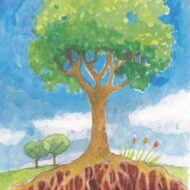the topic is presence. i’m going to merge together a private conversation with some excerpts from joseph zinker’s book in search of good form: gestalt therapy with couples and families.
zinker says presence is…
“that special state of being fully here with all of oneself, one’s body and soul. it is a way of being with, without doing to…the therapists’ presence is ground against which the figure of another self or selves can flourish, brighten, and stand out fully and clearly.”
thomas says:
“it helps to bring out the difference between being and reacting. when you are moving from a place of effortless action, abiding in your true nature, presence simply flows in harmonic currents of being. this is a place of basic trust, it’s even beyond trust, it’s a direct knowing that all is as it should be.
…pure presence is an immediate, centered, beingness of now, unconditioned, infinite.”
whether one is alone or with others, presence catalyzes a beautiful cycle. by simply being oneself, as is, in a place of effortless action, one’s own and other people’s true nature is inspired to emerge. when we are fully present, we create space in which our own and other people’s true nature can flurish, brighten and stand out fully and clearly.
zinker goes on to say,
“presence is the acquired state of awe in the face of an infinitely complex and wondrous universe. presence comes easier when we have already received approval and affirmation — when our cup is full and we no longer need undue acceptance from anyone. presence is easier to experience when we learn to live with other people’s pain and disappointments without having to save or rescue them. presence often comes when we are seasoned and older, when our hot longing has cooled down to a kind of warm, mellow glow.”
and thomas says,
“without that basic trust and knowing we continually need others to mirror our soul’s potentials. when we are infants we need active mirroring and encouragement of those potentials, loving support so we can recognize and grow these essential forms. as we mature we are then able to integrate our deepest potentials as aspects of our identity.”
and in regards to people who are in a state of presence, zinker says:
“in a silent and subtle way, they are grounded and slow rather than light-headed and rushed. in this sate, our breathing is deep, full, even. our sense of time is slow and measured. our body-self is supported and aware…the silence of presence evokes liveliness in the system.”
